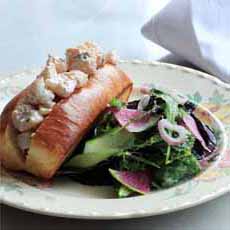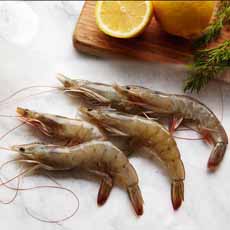TIP OF THE DAY: Substitute Shrimp In A Lobster Roll
|
|
It’s National Shrimp Day. One of the easiest ways to celebrate is: Make yourself a shrimp roll. The photo, which may appear to be a lobster roll, actually contains whole shrimp instead of nuggets of lobster. While we’ve seen many a lobster roll, we hadn’t seen a shrimp roll until we saw these from the website of Kindred restaurant in Davidson, North Carolina. A great idea: Shrimp is more available than lobster, and you likely couldn’t tell the difference in a blind tasting of shrimp salad versus lobster salad. To make its shrimp salad, Kindred uses: We’re not about to bake Japanese milk bread buns. Instead, we buy the brioche version at our local specialty food store. In the Northeast, lobster rolls are served New England-style hot dog-style buns, which have squared edges. You can buy a pan to bake them from King Arthur Flour. Here’s more on the types of hot dog rolls. Shrimp is the most popular shellfish in the U.S., and the most popular seafood overall. Even people who don’t eat fish are known to raise their forks for the tasty shellfish. Thanks to shrimp farming, which supplements the wild catch, there is enough supply available year-round. Shrimp are crustaceans with long, narrow (and delicious!) muscular abdomens. Crustaceans have hard shells—exoskeletons—and many varieties walk on jointed legs. |
|
|
Unlike crustacean cousins like crabs and lobsters, however, shrimp and their close kin, crayfish, and prawns*, are more adapted for swimming than crawling or walking. Americans love their shrimp. The U.S. harvests more than 650 million pounds a year from our own waters and fish farms—more than any other country. Yet, to satisfy our cravings, the U.S. imports an additional 200 million pounds each year (source). Shrimp farming became more prevalent during the 1980s, particularly in China, and by 2007 the harvest from shrimp farms exceeded the capture of wild shrimp (source). The commercial shrimp species is worth some $50 billion a year. Shrimp farming became more prevalent during the 1980s, particularly in China. By 2007 the harvest of farmed shrimp exceeded the capture of wild shrimp (source). There are more than 3,000 species of shrimp worldwide (source). Fossils of the same shrimp that we eat today date to the Late Jurassic, about 155 years ago. Then, a warm shallow sea covered much of what is now Germany. Beautiful shrimp fossils have been found in the limestone there. The English word “shrimp” comes from the Middle English “shrimpe,” meaning pygmy. *The differences between crayfish, prawns, and shrimp: CRAYFISH (also called crawfish and crawdads) are small, freshwater lobsters. Their flavor is milder. SHRIMP are sometimes called prawns, but that is erroneous. While they taste exactly alike, shrimp have lamellar gills (a side plate that overlays segments in front and behind) and carry their eggs outside of their bodies, beneath their tails. PRAWNS have branching gills (side plates that overlap tile-like from front to back), and carry their eggs inside their bodies near their tails. Prawns have claws on three of their five pairs of legs, and shrimp have claws on two of their five pairs of legs. Their gills and body shape are different as well (source). †Mesclun is a mix of assorted small young salad greens that originated in Provence, France. The traditional mix includes arugula, chervil, endive, and leafy lettuces, but may also include baby spinach, collard greens, dandelion greens, frisée, mâche (lamb’s lettuce), mizuna, mustard greens, radicchio, sorrel, Swiss chard, or other fresh leaf vegetables. CHECK OUT WHAT’S HAPPENING ON OUR HOME PAGE, THENIBBLE.COM.
|
||




